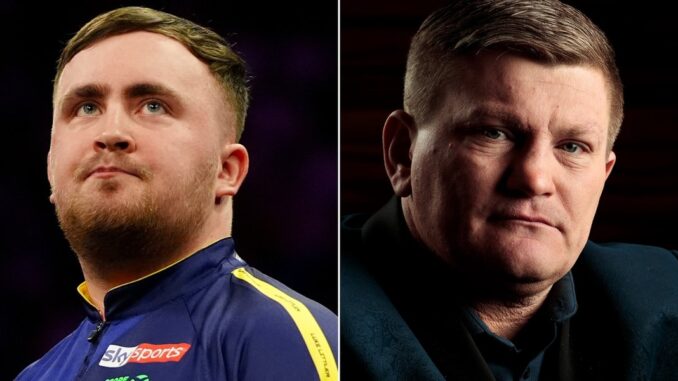
In the heart of Manchester, where sporting legends are forged in the roar of crowds and the grit of competition, a young darts sensation found himself reflecting on a boxing hero whose light had dimmed far too soon. Luke Littler, the 18-year-old prodigy who has taken the world of darts by storm, stepped into the spotlight at the launch of a new Target Darts retail outlet in the city center. But amid the excitement of the event, his words carried a weight of profound sadness, as he paid a heartfelt tribute to Ricky Hatton, the iconic British boxer who tragically passed away at his Manchester home on Sunday at the age of just 46.
Littler, fresh off his meteoric rise that saw him capture the imagination of fans worldwide with his pinpoint precision and unflappable demeanor on the oche, learned of Hatton’s death through his close-knit circle of darts professionals. It was fellow players Chris Dobey and Ross Smith who broke the news to him, a moment that hit hard for the teenager who had long admired the fighter from afar. As tributes flooded social media, Littler couldn’t help but notice the outpouring of grief. “Instagram, Facebook, everything’s just full of Ricky,” he shared, his voice tinged with emotion during the event. The digital waves of remembrance mirrored the physical ones across Manchester, where fans have been leaving flowers and messages at sites honoring Hatton’s extraordinary legacy—a legacy built on ferocious knockouts, unyielding heart, and an infectious charisma that turned every bout into a spectacle.
What made the loss even more personal for Littler was the shared moments of inspiration that bridged their worlds. Long before the bright lights of professional arenas consumed his life, Littler found solace and excitement in the history of combat sports. “What I do, when I’m bored at night, I just go through old boxing fights and stuff like that,” he revealed, painting a picture of quiet evenings spent diving into the archives of the ring. Among those timeless clashes, Hatton’s epic battles stood out, especially when relived alongside his father. Those father-son sessions, huddled around clips of Hatton’s most legendary encounters, forged a bond that went beyond mere fandom. “My dad was talking about it [Hatton’s best bouts], the fight against [Manny] Pacquiao and [Floyd] Mayweather, where he’s winning it. The ref was splitting it up,” Littler recounted, evoking the raw intensity of those moments—the brutal exchanges, the crowd’s frenzy, and Hatton’s warrior spirit that refused to yield.
Hatton, known as “The Hitman,” had been a fixture in British sports for over two decades, amassing world titles in multiple weight classes and becoming a symbol of Manchester’s fighting pride. His bouts weren’t just fights; they were cultural events, drawing tens of thousands to arenas and millions to screens, much like the electric atmosphere Littler now commands in darts. The teenager expressed deep regret over never having the chance to cross paths with his idol. “I think they said he was at the [World Darts] Matchplay for years and years on the run, but I never got the chance to meet him. It is sad,” Littler admitted, highlighting how Hatton had quietly supported the darts scene by attending major tournaments. That unspoken connection, learned through whispers from colleagues, added a layer of poignancy to the tribute, underscoring the interconnected tapestry of British sports where heroes from one arena quietly cheer on the next generation.
As Littler spoke, he drew striking parallels between his own journey and Hatton’s, both rising as solitary warriors who thrived on the energy of adoring fans. When asked about the similarities in how they captivated audiences, he nodded firmly: “Definitely.” It’s a sentiment that resonates deeply in a career where Littler has redefined darts for a new era. “I know myself, I’ve changed the sport in many ways,” he reflected, pointing to the explosive growth that’s turned once-niche events into global phenomena. The Target Darts launch itself was a testament to this evolution—one of the largest such openings the brand has hosted, dwarfing a previous pop-up at West Ham United’s stadium. Littler credited the players’ on-stage performances for fueling this surge: “Us players, we do our job on the board and then it impacts on all the fans wanting to buy all our products.” In much the same way, Hatton’s ring mastery had sparked a renaissance in British boxing, inspiring countless young athletes to lace up gloves and chase glory.
The outpouring of emotion from Littler serves as a reminder of how sports figures like Hatton transcend their disciplines, becoming beacons for dreamers everywhere. In Manchester, the city that cradled both men’s ambitions, tributes continue to mount—flowers at the Etihad Stadium, messages scrawled on walls, and stories shared in pubs where Hatton’s victories were once toasted with fervor. For Littler, the touching ritual of watching those old fights with his father now carries an extra layer of nostalgia, a cherished memory amid the grief. As he navigates his own path to greatness, the teenager’s words honor not just a fallen champion, but the enduring spirit that unites fighters across rings, boards, and generations. Hatton’s influence, it seems, will echo long after the final bell, motivating the next wave of stars like Littler to fight with the same passion and heart.
Leave a Reply